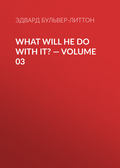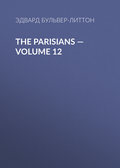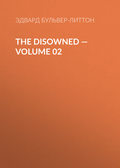
Эдвард Бульвер-Литтон
A Strange Story — Complete
CHAPTER XXIX
I did not see Margrave the following day, but the next morning, a little after sunrise, he walked into my study, according to his ordinary habit.
“So you know something about Sir Philip Derval?” said I. “What sort of a man is he?”
“Hateful!” cried Margrave; and then checking himself, burst out into his merry laugh. “Just like my exaggerations! I am not acquainted with anything to his prejudice. I came across his track once or twice in the East. Travellers are always apt to be jealous of each other.”
“You are a strange compound of cynicism and credulity; but I should have fancied that you and Sir Philip would have been congenial spirits, when I found, among his favourite books, Van Helmont and Paracelsus. Perhaps you, too, study Swedenborg, or, worse still, Ptolemy and Lilly?”
“Astrologers? No! They deal with the future! I live for the day; only I wish the day never had a morrow!”
“Have you not, then that vague desire for the something beyond,—that not unhappy, but grand discontent with the limits of the immediate Present, from which man takes his passion for improvement and progress, and from which some sentimental philosophers have deduced an argument in favour of his destined immortality?”
“Eh!” said Margrave, with as vacant a stare as that of a peasant whom one has addressed in Hebrew. “What farrago of words is this? I do not comprehend you.”
“With your natural abilities,” I asked with interest, “do you never feel a desire for fame?”
“Fame? Certainly not. I cannot even understand it!”
“Well, then, would you have no pleasure in the thought that you had rendered a service to humanity?”
Margrave looked bewildered; after a moment’s pause, he took from the table a piece of bread that chanced to be there, opened the window, and threw the crumbs into the lane. The sparrows gathered round the crumbs.
“Now,” said Margrave, “the sparrows come to that dull pavement for the bread that recruits their lives in this world; do you believe that one sparrow would be silly enough to fly to a house-top for the sake of some benefit to other sparrows, or to be chirruped about after he was dead? I care for science as the sparrow cares for bread,—it may help me to something good for my own life; and as for fame and humanity, I care for them as the sparrow cares for the general interest and posthumous approbation of sparrows!”
“Margrave, there is one thing in you that perplexes me more than all else—human puzzle as you are—in your many eccentricities and self-contradictions.”
“What is that one thing in me most perplexing?”
“This: that in your enjoyment of Nature you have all the freshness of a child, but when you speak of Man and his objects in the world, you talk in the vein of some worn-out and hoary cynic. At such times, were I to close my eyes, I should say to myself, ‘What weary old man is thus venting his spleen against the ambition which has failed, and the love which has forsaken him?’ Outwardly the very personation of youth, and revelling like a butterfly in the warmth of the sun and the tints of the herbage, why have you none of the golden passions of the young,—their bright dreams of some impossible love, their sublime enthusiasm for some unattainable glory? The sentiment you have just clothed in the illustration by which you place yourself on a level with the sparrows is too mean and too gloomy to be genuine at your age. Misanthropy is among the dismal fallacies of gray beards. No man, till man’s energies leave him, can divorce himself from the bonds of our social kind.”
“Our kind! Your kind, possibly; but I—” He swept his hand over his brow, and resumed, in strange, absent, and wistful accents: “I wonder what it is that is wanting here, and of which at moments I have a dim reminiscence.” Again he paused, and gazing on me, said with more appearance of friendly interest than I had ever before remarked in his countenance, “You are not looking well. Despite your great physical strength, you suffer like your own sickly patients.”
“True! I suffer at this moment, but not from bodily pain.”
“You have some cause of mental disquietude?”
“Who in this world has not?”
“I never have.”
“Because you own you have never loved. Certainly, you never seem to care for any one but yourself; and in yourself you find an unbroken sunny holiday,—high spirits, youth, health, beauty, wealth. Happy boy!”
At that moment my heart was heavy within me.
Margrave resumed,—
“Among the secrets which your knowledge places at the command of your art, what would you give for one which would enable you to defy and to deride a rival where you place your affections, which could lock to yourself, and imperiously control, the will of the being whom you desire to fascinate, by an influence paramount, transcendent?”
“Love has that secret,” said I,—“and love alone.”
“A power stronger than love can suspend, can change love itself. But if love be the object or dream of your life, love is the rosy associate of youth and beauty. Beauty soon fades, youth soon departs. What if in nature there were means by which beauty and youth can be fixed into blooming duration,—means that could arrest the course, nay, repair the effects, of time on the elements that make up the human frame?”
“Silly boy! Have the Rosicrucians bequeathed to you a prescription for the elixir of life?”
“If I had the prescription I should not ask your aid to discover its ingredients.”
“And is it in the hope of that notable discovery you have studied chemistry, electricity, and magnetism? Again I say, Silly boy!”
Margrave did not heed my reply. His face was overcast, gloomy, troubled.
“That the vital principle is a gas,” said he, abruptly, “I am fully convinced. Can that gas be the one which combines caloric with oxygen?”
“Phosoxygen? Sir Humphrey Davy demonstrates that gas not to be, as Lavoisier supposed, caloric, but light, combined with oxygen; and he suggests, not indeed that it is the vital principle itself, but the pabulum of life to organic beings.”12
“Does he?” said Margrave, his, face clearing up. “Possibly, possibly, then, here we approach the great secret of secrets. Look you, Allen Fenwick: I promise to secure to you unfailing security from all the jealous fears that now torture your heart; if you care for that fame which to me is not worth the scent of a flower, the balm of a breeze, I will impart to you a knowledge which, in the hands of ambition, would dwarf into commonplace the boasted wonders of recognized science. I will do all this, if, in return, but for one month you will give yourself up to my guidance in whatever experiments I ask, no matter how wild they may seem to you.”
“My dear Margrave, I reject your bribes as I would reject the moon and the stars which a child might offer to me in exchange for a toy; but I may give the child its toy for nothing, and I may test your experiments for nothing some day when I have leisure.”
I did not hear Margrave’s answer, for at that moment my servant entered with letters. Lilian’s hand! Tremblingly, breathlessly, I broke the seal. Such a loving, bright, happy letter; so sweet in its gentle chiding of my wrongful fears! It was implied rather than said that Ashleigh Sumner had proposed and been refused. He had now left the house. Lilian and her mother were coming back; in a few days we should meet. In this letter were inclosed a few lines from Mrs. Ashleigh. She was more explicit about my rival than Lilian had been. If no allusion to his attentions had been made to me before, it was from a delicate consideration for myself. Mrs. Ashleigh said that “the young man had heard from L—— of our engagement, and—disbelieved it;” but, as Mrs. Poyntz had so shrewdly predicted, hurried at once to the avowal of his own attachment, and the offer of his own hand. On Lilian’s refusal his pride had been deeply mortified. He had gone away manifestly in more anger than sorrow.
“Lady Delafield, dear Margaret Poyntz’s aunt, had been most kind in trying to soothe Lady Haughton’s disappointment, which was rudely expressed,—so rudely,” added Mrs. Ashleigh, “that it gives us an excuse to leave sooner than had been proposed,—which I am very glad of. Lady Delafield feels much for Mr. Sumner; has invited him to visit her at a place she has near Worthing. She leaves to-morrow in order to receive him; promises to reconcile him to our rejection, which, as he was my poor Gilbert’s heir, and was very friendly at first, would be a great relief to my mind. Lilian is well, and so happy at the thoughts of coming back.”
When I lifted my eyes from these letters I was as a new man, and the earth seemed a new earth. I felt as if I had realized Margrave’s idle dreams,—as if youth could never fade, love could never grow cold.
“You care for no secrets of mine at this moment,” said Margrave, abruptly.
“Secrets!” I murmured; “none now are worth knowing. I am loved! I am loved!”
“I bide my time,” said Margrave; and as my eyes met his, I saw there a look I had never seen in those eyes before, sinister, wrathful, menacing. He turned away, went out through the sash-door of the study; and as he passed towards the fields under the luxuriant chestnut-trees, I heard his musical, barbaric chant,—the song by which the serpent-charmer charms the serpent,—sweet, so sweet, the very birds on the boughs hushed their carol as if to listen.
CHAPTER XXX
I called that day on Mrs. Poyntz, and communicated to her the purport of the glad news I had received.
She was still at work on the everlasting knitting, her firm fingers linking mesh into mesh as she listened; and when I had done, she laid her skein deliberately down, and said, in her favourite characteristic formula,—
“So at last?—that is settled!”
She rose and paced the room as men are apt to do in reflection, women rarely need such movement to aid their thoughts; her eyes were fixed on the floor, and one hand was lightly pressed on the palm of the other,—the gesture of a musing reasoner who is approaching the close of a difficult calculation.
At length she paused, fronting me, and said dryly,—
“Accept my congratulations. Life smiles on you now; guard that smile, and when we meet next, may we be even firmer friends than we are now!”
“When we meet next,—that will be to-night—you surely go to the mayor’s great ball? All the Hill descends to Low Town to-night.”
“No; we are obliged to leave L—— this afternoon; in less than two hours we shall be gone,—a family engagement. We may be weeks away; you will excuse me, then, if I take leave of you so unceremoniously. Stay, a motherly word of caution. That friend of yours, Mr. Margrave! Moderate your intimacy with him; and especially after you are married. There is in that stranger, of whom so little is known, a something which I cannot comprehend,—a something that captivates and yet revolts. I find him disturbing my thoughts, perplexing my conjectures, haunting my fancies,—I, plain woman of the world! Lilian is imaginative; beware of her imagination, even when sure of her heart. Beware of Margrave. The sooner he quits L—— the better, believe me, for your peace of mind. Adieu! I must prepare for our journey.”
“That woman,” muttered I, on quitting her house, “seems to have some strange spite against my poor Lilian, ever seeking to rouse my own distrust of that exquisite nature which has just given me such proof of its truth. And yet—and yet—is that woman so wrong here? True! Margrave with his wild notions, his strange beauty!—true—true—he might dangerously encourage that turn for the mystic and visionary which distresses me in Lilian. Lilian should not know him. How induce him to leave L——? Ah, those experiments on which he asks my assistance! I might commence them when he comes again, and then invent some excuse to send him for completer tests to the famous chemists of Paris or Berlin.”
CHAPTER XXXI
It is the night of the mayor’s ball! The guests are assembling fast; county families twelve miles round have been invited, as well as the principal families of the town. All, before proceeding to the room set apart for the dance, moved in procession through the museum,—homage to science before pleasure!
The building was brilliantly lighted, and the effect was striking, perhaps because singular and grotesque. There, amidst stands of flowers and evergreens, lit up with coloured lamps, were grouped the dead representatives of races all inferior—some deadly—to man. The fancy of the ladies had been permitted to decorate and arrange these types of the animal world. The tiger glared with glass eyes from amidst artificial reeds and herbage, as from his native jungle; the grisly white bear peered from a mimic iceberg. There, in front, stood the sage elephant, facing a hideous hippopotamus; whilst an anaconda twined its long spire round the stem of some tropical tree in zinc. In glass cases, brought into full light by festooned lamps, were dread specimens of the reptile race,—scorpion and vampire, and cobra capella, with insects of gorgeous hues, not a few of them with venomed stings.
But the chief boast of the collection was in the varieties of the Genus Simia,—baboons and apes, chimpanzees, with their human visage, mockeries of man, from the dwarf monkeys perched on boughs lopped from the mayor’s shrubberies, to the formidable ourangoutang, leaning on his huge club.
Every one expressed to the mayor admiration, to each other antipathy, for this unwonted and somewhat ghastly, though instructive, addition to the revels of a ballroom.
Margrave, of course, was there, and seemingly quite at home, gliding from group to group of gayly-dressed ladies, and brilliant with a childish eagerness to play off the showman. Many of these grim fellow-creatures he declared he had seen, played, or fought with. He had something true or false to say about each. In his high spirits he contrived to make the tiger move, and imitated the hiss of the terribly anaconda. All that he did had its grace, its charm; and the buzz of admiration and the flattering glances of ladies’ eyes followed him wherever he moved.
However, there was a general feeling of relief when the mayor led the way from the museum into the ballroom. In provincial parties guests arrive pretty much within the same hour, and so few who had once paid their respects to the apes and serpents, the hippopotamus and the tiger, were disposed to repeat the visit, that long before eleven o’clock the museum was as free from the intrusion of human life as the wilderness in which its dead occupants had been born.
I had gone my round through the rooms, and, little disposed to be social, had crept into the retreat of a window-niche, pleased to think myself screened by its draperies,—not that I was melancholy, far from it; for the letter I had received that morning from Lilian had raised my whole being into a sovereignty of happiness high beyond the reach of the young pleasure-hunters, whose voices and laughter blended with that vulgar music.
To read her letter again I had stolen to my nook, and now, sure that none saw me kiss it, I replaced it in my bosom. I looked through the parted curtain; the room was comparatively empty; but there, through the open folding-doors, I saw the gay crowd gathered round the dancers, and there again, at right angles, a vista along the corridor afforded a glimpse of the great elephant in the deserted museum.
Presently I heard, close beside me, my host’s voice.
“Here’s a cool corner, a pleasant sofa, you can have it all to yourself. What an honour to receive you under my roof, and on this interesting occasion! Yes, as you say, there are great changes in L—— since you left us. Society has much improved. I must look about and find some persons to introduce to you. Clever! oh, I know your tastes. We have a wonderful man,—a new doctor. Carries all before him; very high character, too; good old family, greatly looked up to, even apart from his profession. Dogmatic a little,—a Sir Oracle,—‘Lets no dog bark;’ you remember the quotation,—Shakspeare. Where on earth is he? My dear Sir Philip, I am sure you would enjoy his conversation.”
Sir Philip! Could it be Sir Philip Derval to whom the mayor was giving a flattering yet scarcely propitiatory description of myself? Curiosity combined with a sense of propriety in not keeping myself an unsuspected listener; I emerged from the curtain, but silently, and reached the centre of the room before the mayor perceived me. He then came up to me eagerly, linked his arm in mine, and leading me to a gentleman seated on a sofa, close by the window I had quitted, said,—
“Doctor, I must present you to Sir Philip Derval, just returned to England, and not six hours in L——. If you would like to see the museum again, Sir Philip, the doctor, I am sure, will accompany you.”
“No, I thank you; it is painful to me at present to see, even under your roof, the collection which my poor dear friend, Dr. Lloyd, was so proudly beginning to form when I left these parts.”
“Ay, Sir Philip, Dr. Lloyd was a worthy man in his way, but sadly duped in his latter years; took to mesmerism, only think! But our young doctor here showed him up, I can tell you.”
Sir Philip, who had acknowledged my first introduction to his acquaintance by the quiet courtesy with which a well-bred man goes through a ceremony that custom enables him to endure with equal ease and indifference, now evinced by a slight change of manner how little the mayor’s reference to my dispute with Dr. Lloyd advanced me in his good opinion. He turned away with a bow more formal than his first one, and said calmly,
“I regret to hear that a man so simple-minded and so sensitive as Dr. Lloyd should have provoked an encounter in which I can well conceive him to have been worsted. With your leave, Mr. Mayor, I will look into your ballroom. I may perhaps find there some old acquaintances.”
He walked towards the dancers, and the mayor, linking his arm in mine, followed close behind, saying in his loud hearty tones,—
“Come along, you too, Dr. Fenwick, my girls are there; you have not spoken to them yet.”
Sir Philip, who was then half way across the room, turned round abruptly, and, looking me full in the face, said,—
“Fenwick, is your name Fenwick,—Allen Fenwick?”
“That is my name, Sir Philip.”
“Then permit me to shake you by the hand; you are no stranger, and no mere acquaintance to me. Mr. Mayor, we will look into your ballroom later; do not let us keep you now from your other guests.”
The mayor, not in the least offended by being thus summarily dismissed, smiled, walked on, and was soon lost amongst the crowd.
Sir Philip, still retaining my hand, reseated himself on the sofa, and I took my place by his side. The room was still deserted; now and then a straggler from the ballroom looked in for a moment, and then sauntered back to the central place of attraction.
“I am trying to guess,” said I, “how my name should be known to you. Possibly you may, in some visit to the Lakes, have known my father?”
“No; I know none of your name but yourself,—if, indeed, as I doubt not, you are the Allen Fenwick to whom I owe no small obligation. You were a medical student at Edinburgh in the year ——?”
“Yes.”
“So! At that time there was also at Edinburgh a young man, named Richard Strahan. He lodged in a fourth flat in the Old Town.”
“I remember him very well.”
“And you remember, also, that a fire broke out at night in the house in which he lodged; that when it was discovered there seemed no hope of saving him. The flames wrapped the lower part of the house; the staircase had given way. A boy, scarcely so old as himself, was the only human being in the crowd who dared to scale the ladder that even then scarcely reached the windows from which the smoke rolled in volumes; that boy penetrated into the room, found the inmate almost insensible, rallied, supported, dragged him to the window, got him on the ladder,—saved his life then: and his life later, by nursing with a woman’s tenderness, through the fever caused by terror and excitement, the fellow-creature he had rescued by a man’s daring. The name of that gallant student was Allen Fenwick, and Richard Strahan is my nearest living relation. Are we friends now?”
I answered confusedly. I had almost forgotten the circumstances referred to. Richard Strahan had not been one of my more intimate companions, and I had never seen nor heard of him since leaving college. I inquired what had become of him.
“He is at the Scotch Bar,” said Sir Philip, “and of course without practice. I understand that he has fair average abilities, but no application. If I am rightly informed, he is, however, a thoroughly honourable, upright man, and of an affectionate and grateful disposition.”
“I can answer for all you have said in his praise. He had the qualities you name too deeply rooted in youth to have lost them now.”
Sir Philip remained for some moments in a musing silence; and I took advantage of that silence to examine him with more minute attention than I had done before, much as the first sight of him had struck me.
He was somewhat below the common height,—so delicately formed that one might call him rather fragile than slight. But in his carriage and air there was remarkable dignity. His countenance was at direct variance with his figure; for as delicacy was the attribute of the last, so power was unmistakably the characteristic of the first. He looked fully the age his steward had ascribed to him,—about forty-eight; at a superficial glance, more, for his hair was prematurely white,—not gray, but white as snow. But his eyebrows were still jet black, and his eyes, equally dark, were serenely bright. His forehead was magnificent,—lofty and spacious, and with only one slight wrinkle between the brows. His complexion was sunburnt, showing no sign of weak health. The outline of his lips was that which I have often remarked in men accustomed to great dangers, and contracting in such dangers the habit of self-reliance,—firm and quiet, compressed without an effort. And the power of this very noble countenance was not intimidating, not aggressive; it was mild, it was benignant. A man oppressed by some formidable tyranny, and despairing to find a protector, would, on seeing that face, have said, “Here is one who can protect me, and who will!”
Sir Philip was the first to break the silence.
“I have so many relations scattered over England, that fortunately not one of them can venture to calculate on my property if I die childless, and therefore not one of them can feel himself injured when, a few weeks hence, he shall read in the newspapers that Philip Derval is married. But for Richard Strahan at least, though I never saw him, I must do something before the newspapers make that announcement. His sister was very dear to me.”
“Your neighbours, Sir Philip, will rejoice at your marriage, since, I presume, it may induce you to settle amongst them at Derval Court.”
“At Derval Court! No! I shall not settle there.” Again he paused a moment or so, and then went on: “I have long lived a wandering life, and in it learned much that the wisdom of cities cannot teach. I return to my native land with a profound conviction that the happiest life is the life most in common with all. I have gone out of my way to do what I deemed good, and to avert or mitigate what appeared to me evil. I pause now and ask myself, whether the most virtuous existence be not that in which virtue flows spontaneously from the springs of quiet everyday action; when a man does good without restlessly seeking it, does good unconsciously, simply because he is good and he lives. Better, perhaps, for me, if I had thought so long ago! And now I come back to England with the intention of marrying, late in life though it be, and with such hopes of happiness as any matter-of-fact man may form. But my hope will not be at Derval Court. I shall reside either in London or its immediate neighbourhood, and seek to gather round me minds by which I can correct, if I cannot confide to them, the knowledge I myself have acquired.”
“Nay, if, as I have accidentally heard, you are fond of scientific pursuits, I cannot wonder, that after so long an absence from England, you should feel interest in learning what new discoveries have been made, what new ideas are unfolding the germs of discoveries yet to be. But, pardon me, if in answer to your concluding remark, I venture to say that no man can hope to correct any error in his own knowledge, unless he has the courage to confide the error to those who can correct. La Place has said, ‘Tout se tient dans le chaine immense des verites;’ and the mistake we make in some science we have specially cultivated is often only to be seen by the light of a separate science as specially cultivated by another. Thus, in the investigation of truth, frank exposition to congenial minds is essential to the earnest seeker.”
“I am pleased with what you say,” said Sir Philip, “and I shall be still more pleased to find in you the very confidant I require. But what was your controversy with my old friend, Dr. Lloyd? Do I understand our host rightly, that it related to what in Europe has of late days obtained the name of mesmerism?”
I had conceived a strong desire to conciliate the good opinion of a man who had treated me with so singular and so familiar a kindness, and it was sincerely that I expressed my regret at the acerbity with which I had assailed Dr. Lloyd; but of his theories and pretensions I could not disguise my contempt. I enlarged on the extravagant fallacies involved in a fabulous “clairvoyance,” which always failed when put to plain test by sober-minded examiners. I did not deny the effects of imagination on certain nervous constitutions. “Mesmerism could cure nobody; credulity could cure many. There was the well-known story of the old woman tried as a witch; she cured agues by a charm. She owned the impeachment, and was ready to endure gibbet or stake for the truth of her talisman,—more than a mesmerist would for the truth of his passes! And the charm was a scroll of gibberish sewn in an old bag and given to the woman in a freak by the judge himself when a young scamp on the circuit. But the charm cured? Certainly; just as mesmerism cures. Fools believed in it. Faith, that moves mountains, may well cure agues.”
Thus I ran on, supporting my views with anecdote and facts, to which Sir Philip listened with placid gravity.
When I had come to an end he said: “Of mesmerism, as practised in Europe, I know nothing except by report. I can well understand that medical men may hesitate to admit it amongst the legitimate resources of orthodox pathology; because, as I gather from what you and others say of its practice, it must, at the best, be far too uncertain in its application to satisfy the requirements of science. Yet an examination of its pretensions may enable you to perceive the truth that lies hid in the powers ascribed to witchcraft; benevolence is but a weak agency compared to malignity; magnetism perverted to evil may solve half the riddles of sorcery. On this, however, I say no more at present. But as to that which you appear to reject as the most preposterous and incredible pretension of the mesmerists, and which you designate by the word ‘clairvoyance,’ it is clear to me that you have never yourself witnessed even those very imperfect exhibitions which you decide at once to be imposture. I say imperfect, because it is only a limited number of persons whom the eye or the passes of the mesmerist can effect; and by such means, unaided by other means, it is rarely indeed that the magnetic sleep advances beyond the first vague shadowy twilight-dawn of that condition to which only in its fuller developments I would apply the name of ‘trance.’ But still trance is as essential a condition of being as sleep or as waking, having privileges peculiar to itself. By means within the range of the science that explores its nature and its laws, trance, unlike the clairvoyance you describe, is producible in every human being, however unimpressible to mere mesmerism.”
“Producible in every human being! Pardon me if I say that I will give any enchanter his own terms who will produce that effect upon me.”
“Will you? You consent to have the experiment tried on yourself?”
“Consent most readily.”
“I will remember that promise. But to return to the subject. By the word ‘trance’ I do not mean exclusively the spiritual trance of the Alexandrian Platonists. There is one kind of trance,—that to which all human beings are susceptible,—in which the soul has no share: for of this kind of trance, and it was of this I spoke, some of the inferior animals are susceptible; and, therefore, trance is no more a proof of soul than is the clairvoyance of the mesmerists, or the dream of our ordinary sleep, which last has been called a proof of soul, though any man who has kept a dog must have observed that dogs dream as vividly as we do. But in this trance there is an extraordinary cerebral activity, a projectile force given to the mind, distinct from the soul, by which it sends forth its own emanations to a distance in spite of material obstacles, just as a flower, in an altered condition of atmosphere, sends forth the particles of its aroma. This should not surprise you. Your thought travels over land and sea in your waking state; thought, too, can travel in trance, and in trance may acquire an intensified force. There is, however, another kind of trance which is truly called spiritual, a trance much more rare, and in which the soul entirely supersedes the mere action of the mind.”







